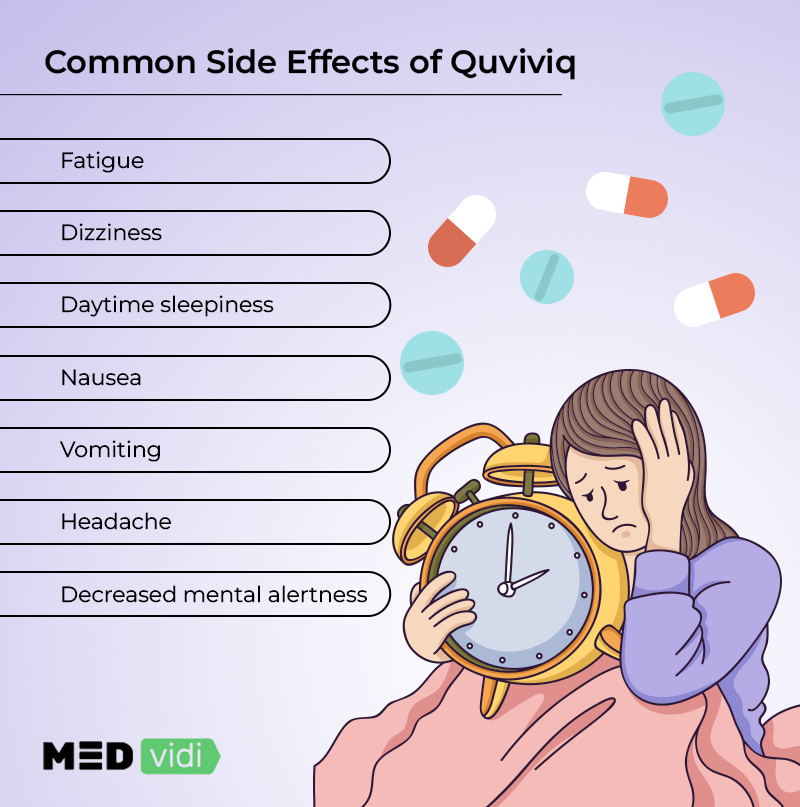A popular prescription drug called Quviviq (sleep medicine) has FDA approval to treat adult insomnia. The active ingredient in Quviviq is daridorexant which is a member of a class of dual orexin receptor antagonists (DORAs).
Due to its potential for misuse or dependence, Quviviq is a substance that is under federal regulation (Schedule Pending). It’s vital to use it under a healthcare provider’s supervision to prevent abuse and misuse.
Find out the details of using Quviviq for insomnia in the article below!
Ask a doctor to provide you with a prescription for sleeping aids. Click the button below!
What Is Quviviq, and How Does It Work?
Overactive brain impulses, including the increased activity of the chemical orexin, may be present in insomnia patients. It is thought that orexin helps your brain stay awake. It transmits signals via binding to the brain’s OX1R and OX2R receptors, which have unique binding sites.
Quviviq works in your body by blocking the activity of orexin receptors OX1R and OX2R. Orexin can’t stimulate your brain to stay awake if the receptors stop it from adhering to them. You might be able to sleep better and longer due to this effect.
What is Quviviq Used for?
Prescription medications like Quviviq are authorized by the Food and Drug Administration (FDA) to treat particular illnesses — insomnia in the case of this drug. Still, Quviviq may be used for other conditions in the future with further research and clinical testing. An FDA-approved medicine is used off-label when it is prescribed for a use that is not permitted.
Quviviq for Insomnia
Quviviq drug can be prescribed to treat adult insomnia that comes in either one or both of the following forms:
- Sleep-onset insufficiency. It could be difficult for you to fall asleep if you have insomnia with sleep onset.
- Insomnia with sleep maintenance problems. You can wake up in the middle of the night with sleep maintenance insomnia and be unable to go back to sleep.
Ask a doctor to provide you with a sleeping prescription online. Click the button below!
Quviviq Dosing for Insomnia
25 mg to 50 mg of Quviviq is the suggested dosage range. It should be taken each night. Take your medication 30 minutes before you go to bed and at least 7 hours before you intend to get up.
People with liver issues should take a lesser dose. Additionally, a lower dose is advised for patients using specific drugs that may interact with Quviviq. Also, narcolepsy patients should not take this drug.
What are the Side Effects of Quviviq?
Quviviq’s side effects might range from mild to severe. The most significant adverse effects that could happen when taking Quviviq are listed below. These lists don’t include every potential negative effect.

Mild Side Effects
- Sleepiness the day after taking Quviviq
- Fatigue
- Nausea
- Decreased mental alertness
- Dizziness
- Vomiting
- Headache
Severe Side Effects
Although they are not common, serious adverse effects from Quviviq can happen.
- Sleep paralysis
- Hallucinations that occur as you’re falling asleep or waking up
- Excessive sleepiness
- Complex sleep behaviors (performing activities while asleep)
- Decreased alertness and responsiveness
- Suicidal ideations or behaviors
Consult your doctor for further details on Quviviq’s potential adverse effects. They can offer you advice on how to deal with any side effects that could worry or annoy you.
Allergic Reactions
Like with most medications, taking Quviviq can cause allergic reactions in some people. In the drug’s clinical trials, this side effect wasn’t documented, but it’s still possible. It manifests itself in the following way:
- Skin rash
- Itchiness
- Flushing
Although uncommon, a more serious allergic reaction is possible. A strong allergic reaction may cause the following symptoms:
- Swelling under your skin, usually in your hands, feet, lips, or eyelids
- Difficulty breathing
- Tongue, mouth, or throat swelling
At The End
Quviviq for insomnia is useful. Despite its benefits, this medication occasionally leads to addiction. In order to reduce the chance of addiction, take this medication exactly as directed. Consult your doctor for additional information.













